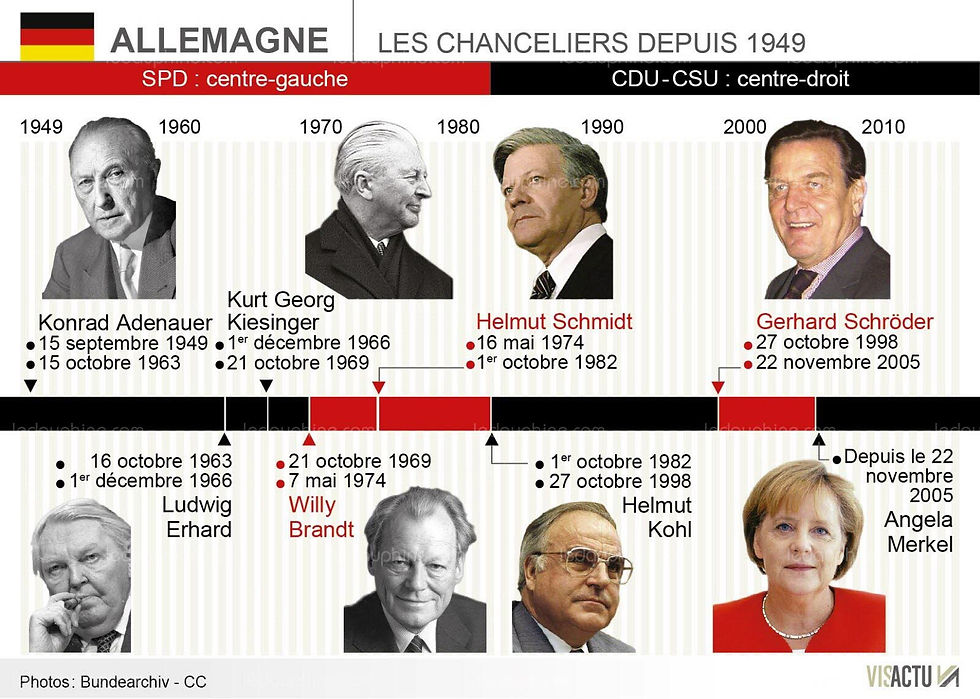The German Government
- *Mathilda*

- 25 mai 2019
- 2 min de lecture
Dernière mise à jour : 4 juin 2019

The German governments are relatively tight compared to those of other democracies: the largest have about twenty people, and the average is now around fifteen people. Merkel's cabinet includes sixteen people.
The Federal Government is therefore the government in the narrow sense, comparable to the Council of Ministers in France.
THE FEDERAL CHANCELLOR

The head of government is the Federal Chancellor (Bundeskanzler, or Bundeskanzlerin for women). It directs the action of the Federal Government and is the central point of executive power, so much so that the German political system is called "Chancellor's democracy" (Kanzlerdemokratie). The Federal Chancellor also assumes the responsibility of the Federal Government before the Bundestag: he is elected by the Bundestag by a majority of his members, and can only be overthrown by him.
FEDERAL MINISTERS
Federal Ministers are appointed by the Federal President on the proposal of the Federal Chancellor. The Chancellor decides on their number, titles and distribution of their skills. Its margin of decision is legally limited only with regard to the powers of the Ministers of Defense, Finance and Justice. The Chancellor's proposal is the result of his own competence and is not subject to any parliamentary
approval.
A federal minister does not have to be a member of the Bundestag, but can not exercise any other professional activity while in office. His term ends either with his dismissal by the Federal President on the proposal of the Chancellor, or when the functions of the Chancellor himself expire. He may resign, but his resignation is effective only after the Federal President has terminated his office.
The Federal Chancellor appoints one of the federal ministers as his substitute. The substitute of the Federal Chancellor (Stellvertreter of the Bundeskanzlers or Bundeskanzlerin), more commonly called the Vice Chancellor (Vizekanzler), fulfills the functions of the Chancellor when he is prevented. He also replaces the Chancellor at the request of the latter, for example when a trip prevents him from presiding over a cabinet meeting.

ORGANIZATION
Article 65 of the Basic Law has three principles on decision-making in the Federal Government:
• The Chancellor Principle (Kanzlerprinzip): the Federal Chancellor "sets the broad policy guidelines": these guidelines oblige the members of the cabinet, who, at their level of competence, can not take decisions that would be contrary to them.
• The Principle of Competence (Ressprinzip): Each federal minister can "run" his department independently and under his own responsibility. He can prepare legislative projects without the intervention of the Chancellor or the Cabinet, provided that he follows the general directions of the policies given by the Chancellor, and answers his decisions to the Bundestag.
• The principle of collegiality (Kollegialprinzip): The cabinet "decides differences of opinion between federal ministers" and discusses the most important cases, including participation in the legislative process, the convening of the conciliation committee, the making of regulations.
This article also states that the government work is organized by the Federal Government Regulations (Geschäftsordnung der Bundesregierung, GOBReg), taken by the Chancellor after approval of the Federal President. This regulation was published on May 11, 1951 by Konrad Adenauer, and last modified in 2002.
SOURCES
https://fr.wikipedia.org/wiki/Gouvernement_fédéral_(Allemagne)
https://www.ledauphine.com/france-monde/2017/06/16/l-ancien-chancelier-allemand-helmut-kohl-est-mort
https://www.de.digital/DIGITAL/Redaktion/EN/Meldungen/2016/2016-12-13-gabriel-and-sapin-strengthen-digital-partnership.html



Commentaires